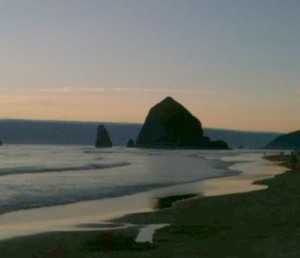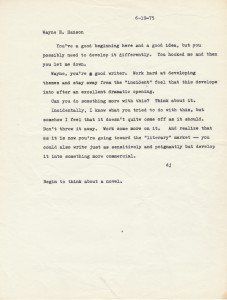I have some vivid memories of my first writer’s conference in 1975. I had just returned from a teaching gig in Micronesia, and , unemployed, settled into a cheap apartment in Northwest Portland, Oregon. I had a typewriter, a chair, a table, bicycle and bed, and the bathroom was down the hall. The bathtub was used by several residents to wash dishes, so sometimes the bathtub ring was comprised of spaghetti sauce. That was what I thought a writer’s life would be like, what it was supposed to be like.
I read about a writer’s conference out at the Oregon coast, called Haystack, a Summer Session in the Arts, sponsored by Portland State University. I scraped together some cash and hit the road – on my 10-speed with camping gear and typewriter. It was a blast! We met with instructors and other writers in the morning at the Cannon Beach Grade School, then wrote in the afternoons. The instructors were writers themselves, not college professors, and I discovered I had to unlearn a lot of what I was taught in college.
I took a class from Eloise Jarvis McGraw and during the class she mentioned that her first published book was Sawdust in his Shoes, about a boy who runs away and joins the circus. I was electrified! In first grade in a little logging camp in Oregon, the teacher read us chapters from “Sawdust in his Shoes,” each afternoon, and here I was actually meeting the author of that book. So I learned that authors were real people, which was a surprise to me for some reason. And she made a good living as a writer and later when I joined her writing group, I discovered she lived in a beautiful house in Lake Oswego and drove a Mercedes. I was confused.
What happened to the drafty garret, the poverty, the drunkenness that was the mark of a “real” writer — at least the real writer as imagined by 1960s-era college professors? One college writing instructor gave us examples of how drunkenness and drugs “elevated writing far beyond the reach of sobriety.” And yet Eloise was a successful writer who lived in a nice house, had a wonderful family, seemed quite sober and businesslike, and took time out of her busy schedule to help beginning writers.
And there were more realizations to come. The spark plug of Haystack’s writing program was Don James, a 70-something professional writer. He’d come from the copper mining country of Montana, and wrote under five different pen names. He wrote ads and books, and magazine stories. To impoverished writers needing to make copies of manuscripts (this was the 70s, remember) he told us we could “refresh” carbon paper by baking it in an oven. Just like new! Here was a pro writer who had been in the trenches and knew what it was like to struggle, but his goal for us was big money and a movie contract.
I had been an English major in college and was still trying to write for a literary market – the peak of excellence was the Northwest Review – and Don tried to turn me to the dark side – the commercial marketplace scorned and denigrated by the literary denizens of the University of Oregon.
Don had a very different way of handling students. In college, you’d read your work aloud, and then the rest of the class would tear it to shreds, with witty putdowns and clever observations. Don had worked as a newspaper copy chief and he approached writers as a copy chief. He was the only one who would criticize work. His purpose was to help correct weak areas while encouraging the writer. And he did a very good job of that.
He scoffed at the academic writers, because they wrote for literary journals with a few hundred subscribers, not for the broad public. He had us go to the Cannon Beach bookstore and look at the bestsellers. “Read the first paragraph,” he said, “and see what you think.” Jaws and Shogun proved his point. Shogun became my all-time favorite novel, and historical fiction fascinates me to this day. Imagine weaving together fictional characters with historical fact, in a sort of time machine. The writer can go back and change the past, make it personal, make it his own creation. He gave us assignments as an editor would, then turned us loose to write whatever we wanted.
The “Soggy Doggie” hot dog cookout – so called because it usually rained –was held on the beach each Wednesday. We shared the beach with students learning raku, and our conversations always included wine, and writing and woodsmoke and women and on uncloudy occasions, the sunset on the ocean, Haystack Rock in silhouette.
I remember walking through Cannon Beach in the fog, the smell of lumberyard cedar, everything muffled, wrapped in the writing life and the Oregon coast, and I wanted to live the rest of my life as a writer. Life was so very good. But I had to return to Portland, get a job, earn a living, etc. etc. I did look up Don at his office in Portland, in the Dekum building, and kept in touch with him over the years. And I invited Eloise’s writing group to meet at the Delphian School in Sheridan, Ore. As writers, they were very interested in Study Tech, and it went very well.
There was a lot of life in Don James, a lot of humor and passion and writing. He exemplified the writing life for me, a vitality and curiosity about existence. He told me I was already a writer. All I needed to do was make some money at it.
He had hopes for me, he said, and he thought that one day I might make it. But I had a lot of work to do. I attended for several years, but when I returned a decade later, Haystack had fallen into the hands of the academics, There were some excellent writers there, and I took a class from Ursula Hegi, but Don and Eloise were no longer connected with it and I was disappointed. And today, I am still working on throwing off the academic-literary-quarterly writing style and fully embracing the business of writing which Don outlined so well.
Well, now that I’m not working a 9 to 5, and since I am doing my own writing, I began to yearn for those summers writing on the beach. I started checking around for writing conferences. I get a newsletter from Willamette Writers and checked out their summer conference, as well as conferences around California and so on. But they can be very expensive, although now most offer a chance to pitch to agents and publishers.
And then I ran across a conference in Iceland! I’ve always wanted to go to Iceland, and to go to a writing conference there would be fascinating. The Walter Mitty movie rekindled my interest in Iceland and Greenland, and here was a chance to go. Will I? The story is yet to be written.




Recent Comments